News for 04 July 2021
All the news for Sunday 4 July 2021
2021 Test Matches POL v SUI (M) - 4 July
Gniezno (POL)
2 Jul 2021 POL v SUI 3 - 0
3 Jul 2021 POL v SUI 2 - 1
FIH Match Centre
2021 Test Matches ESP v ARG (M) - 4 July
Valencia (ESP)
Times GMT +2
4 Jul 2021 11:00 ESP v ARG
5 Jul 2021 11:00 ESP v ARG
7 Jul 2021 11:00 ESP v ARG
FIH Match Centre
Respite for reserves as Tokyo Olympic hockey rules relaxed
Each National Olympic Committee will be able to use those athletes originally picked as playing reserve in each match during Tokyo Games.
By Rod Gilmour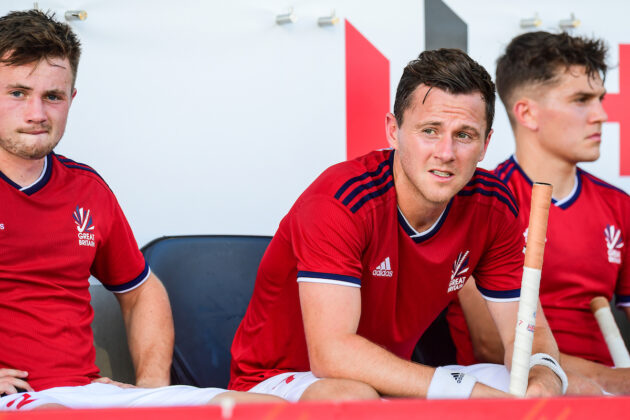
Alan Forsyth ready for action if called upon PIC: WORLDSPORTPICS
Olympic hockey teams in Tokyo will be able to call upon their two playing reserves after competition rules were relaxed across five sports just three weeks out from the start.
The Hockey Paper understands that the FIH sent a missive to squads on Friday and competing nations can now use the 17th and 18th squad members, who were previously only able to play if injuries occurred from the original 16-strong selections.
This means that in the case of Great Britain, Alan Forsyth and Harry Martin can play a major part for the men’s side at the Tokyo Games, while the same applies for Amy Costello and Sarah Evans in the women’s squad.
It effectively means that each nation can name a matchday 16 in a wider 18-strong squad, with one reserve. Teams also have the option to include a spare goalkeeper.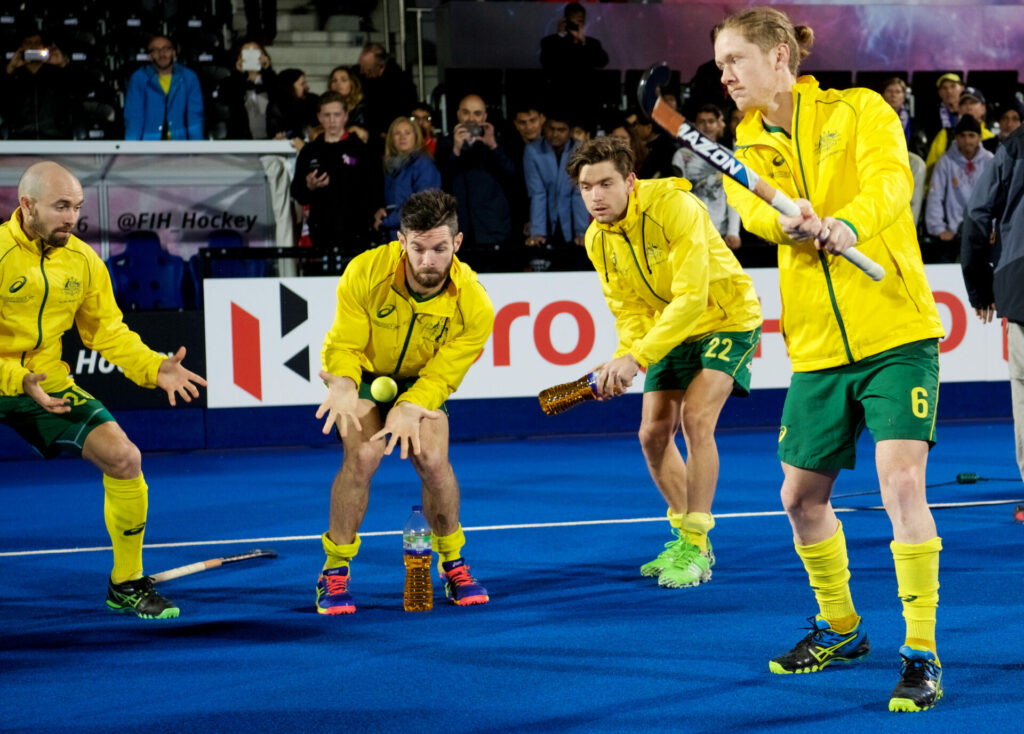
Reserves can play in Tokyo PIC: World Sport Pics
The International Olympic Committee said that the changes ensured “further flexibility for team selections in several sports.”
The IOC said in a statement: “Previously, “alternate” replacements were available in the sports of football, handball, hockey, rugby and water polo; however these were available only as permanent replacements for the Olympic squads. Now each National Olympic Committee (NOC) will be able to use these athletes in each match.
“This will not increase the number of athletes on site in Japan, but will give more flexibility to select within the wider squads, recognising the unique situation for the Olympic Games Tokyo 2020 and giving NOCs maximum flexibility in choosing match squads.”
The Dutch Hockey Federation welcomed the U-turn.
Jeroen Bijl, Dutch hockey’s technical director, told hockey.nl: “This is a positive decision. It’s nice that the coaches have more room to switch.
“A year or two ago we argued for an expansion to 18 players. At the time, of course, not because of Covid, but because of the heat. That heat still exists, combined with the busy schedule – where our teams sometimes have to play two days in a row – it’s nice that the coaches have more choice and space.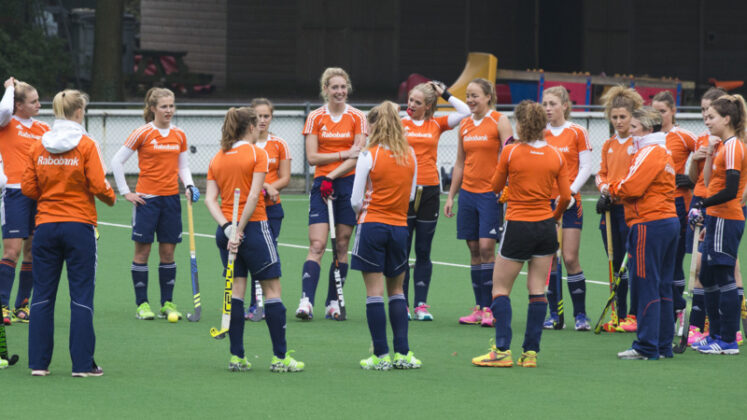
“It is up to the coaches how they will fill that in.”
The Tokyo Olympic football squads originally featured 18 players plus four reserves, but the expansion will see these four back-ups as part of the full squads.
It is not yet known whether this ‘flexibility’ ruling is due to Covid or heat and humidity reasons.
The hockey competition gets under way at the Oi Stadium on July 24 when Japan men take on Australia.
SIGN UP for The Hockey Paper’s returning newsletter: Promotions, exclusives and our best coverage
The Hockey Paper
IOC makes Covid-19 Changes to 2021 Olympic Hockey Format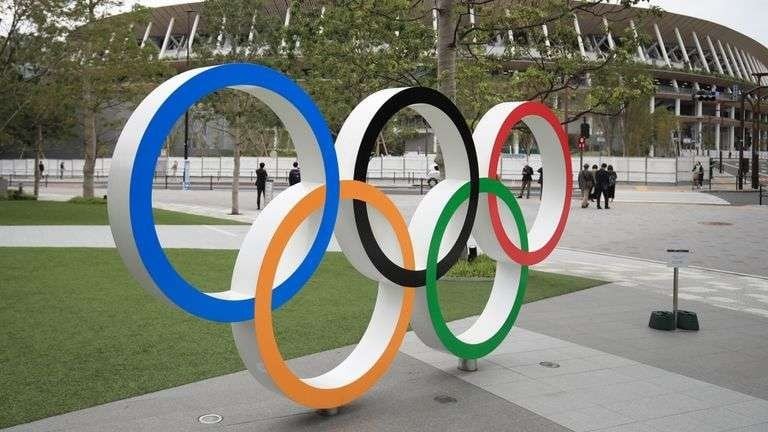
Because of COVID-19, the International Olympic Committee (IOC) allows for more exchange options at the hockey tournaments in Tokyo. The game’s match selection will remain at sixteen players, but coaches will now have the option of including the original two reserve players per match. Goalkeepers are still unable to be changed in the middle of a game.
1956 Olympics hockey: Winners again for the sixth Games running
“Come on, India!” the war cry roars from the Indian spectators after the interval. India respond with a goal. All have been waiting for this.
David Martin
India’s Raghbir Singh Bhola fights for possession in the final against Pakistan on December 6, 1956. India won 1-0. - The Hindu Photo Library
I may not know much about hockey, but I have acquired a sense of occasions. So let me tell you a little about what a lay enthusiast saw at the Melbourne Cricket Ground, where India, for the sixth Olympiad running, went in to fight for the gold medal.
It is a sultry day, the sort of day that in India would come before the rains. For the first time since the Games began, a thin layer of cloud obscures the sun. The tiers of the huge arena are not more than a third full and white summer dresses dominate against a background of light brown stone. Under the scoreboard, on which so many breathtaking results have been flashed before, sit some 70 red-coated army musicians, who entertain us in the intervals.
It seems that every Indian in Australia is in the stadium, and for that matter, every loyal Pakistani. Just on four o’clock, Balbir Singh and Hamid lead their boys in.
Captain Balbir Singh leads his team.
Germany and Britain first slog it out for the bronze medal and to this comparative tyro it does not seem a very good match. In any case, everybody waits for India. We had expected to see Britain oppose them in the final, but Britain were beaten by Germany. So the clock creeps on, the press stand by degrees begins to fill up, though unlike on the great athletic days the previous week, there is still plenty of room and people settle down behind their binoculars.
The teams now come out and Cowlishaw, the English referee runs his hand over the 22 sticks. Balbir pats down the little white cloth that covers his topknot — and the game is under way, 15 minutes behind schedule. This is different from the Germany-Britain match. The film unrolls fast and furious. Nasir plays barefoot. Gurdev Singh falls heavily and Anwar and his stick are everywhere for Pakistan. Balbir Singh takes off his shoes and Bakshish’s shoes come off too. Nasir puts his soul into it. “Intoxicating hockey,” sighs a Karachi reporter behind me.
Zakir at goal uses the stick to smack a scooped ball high over his goal. Anwar’s green jersey is black with sweat. Balbir’s hair lies all over the place now. In the 32nd minute, there is a corner against India. Two false starts and there is nearly a goal. Hamid is the name on every Pakistani’s lips. India get the best out of the bullies and display better ball control. But it is an open game. At half-time, there is no score.
“Come on, India!” the war cry roars from the Indian spectators after the interval. India respond with a goal. All have been waiting for this. Gurdev Singh is everywhere. Pakistan get their second wind. An Indian infringement and a penalty bully follows. Amir Kumar deserves a gold medal for saving it. Pakistan are on the march now and anything can happen yet. The “Come on, India” cries are somewhat strident now. Time is up and India are safe. A wonderful victory, if a narrow one. They carry off Balbir Singh.
This article was published in the December 29, 1956 edition of Sport & Pastime.
Sportstar
1960 Olympics hockey: Laying the groundwork for four years later
In Rome, we knew it wouldn’t be easy. India had managed to win 1-0 against Pakistan in 1956 and there were other teams coming up fast, including Australia.
Charanjit Singh
Pakistan’s Bashir Ahmed duels with India’s Jaswant Singh in the final of the Rome Olympics on September 9, 1960. Pakistan won 1-0. - The Hindu Photo Library
To be the first Indian hockey team to return without an Olympic gold medal is not something to be proud of, but that setback laid the groundwork for four years later.
To make the cut for even the probables list of the Olympic team was considered a huge achievement back then; being part of the actual team was more difficult. I was included for the trials after impressing the federation at three domestic tournaments on the trot in 1959 – the Bombay Gold Cup, the Aga Khan Gold Cup and the National Championships.
That was just the start, though. With at least five players vying for every single spot, and all equally good, it was not easy. On top of that, as a midfielder, my competitors included the legendary Leslie Claudius, who would be the captain. But I managed to make the cut, along with Joseph Antic, and even got to play all the games despite being the youngest of the lot.
In Rome, we knew it wouldn’t be easy. India had managed to win 1-0 against Pakistan in 1956 and there were other teams coming up fast, including Australia. But it was not a weak team; we were capable of winning gold. We had the experience of Claudius and Raghbir Singh Bhola and the inimitable Shankar Laxman in the goal. We had Prithipal Singh and Udham Singh in the ranks.
India captain Leslie Claudius takes the second step on the podium. - The Hindu Photo Library
But the team could not combine well. For some reason, the flow wasn’t there. The Europeans were stronger and I think we made the mistake of trying to outplay them in their style. It wasn’t suited to us. But we must also remember that times were changing, the competition was increasing. There could not be 10, 12 or 15 goals scored in a game any more by any team. The 1956 final had established that. The final was close and Pakistan managed to score early. We tried but could not find the target. It was a strange feeling to not hear the national anthem at an Olympic stadium; it had never happened before. If you ask me or anyone from that time, no one can explain either the result or that feeling.
For me, personally, the lessons learnt were to help me in Tokyo four years later. As captain, it was to be my finest hour, defeating Pakistan again in the final and reclaiming the gold. It was like restoring lost honour, taking what was rightfully ours.
Charanjit Singh, a member of the 1960 squad, captained India to gold at the 1964 Olympics.
As told to Uthra Ganesan
Sportstar
1964 Tokyo Olympics hockey: A minute appeared longer than an hour
I felt a strange numbness after the match, but the realisation of the great victory sunk in when the national anthem started playing after the medal ceremony.
Gurbux Singh
“Redeeming the gold was the top priority,” recalls Gurbux Singh. - The Hindu Photo Library
India had missed the gold at the 1960 Rome Olympics. It was a big disappointment for us as India had been winning the Olympic gold ever since hockey had become a permanent fixture in 1928 at the Paris Games. Redeeming the gold was the top priority as we travelled to Tokyo, which was the first Asian venue hosting an Olympics. We had lost to arch-rival Pakistan in the previous edition and there was a huge expectation on us to regain the top spot.
Nothing can be better in the life of a sportsperson than to represent the country in the Olympics. For us, the task was even bigger as we were shouldering the hopes of our country. Hockey was the only sport where we had a realistic chance of winning the gold.
We had a disappointing start to our campaign as we drew two crucial matches — against Germany and Spain — in our first three outings. We were under a lot of pressure as another draw would probably have meant an exit from the event. The team management identified the flaw and reshuffled the forward line to get the team back in its rhythm. We recovered in time and went on to beat a big side like Holland in the last group league match. Once in the semifinals, we convincingly beat Australia to ensure a meeting with Pakistan in the final. I will remember the 1964 Games because of the new position I was asked to play. I had been a right full-back all along, but as our regular left-half was not playing well during the preparatory trip to New Zealand, I was asked to step in his place. I was scared of the proposition as I had to make a lot of adjustments to my game, but I accepted the challenge for the sake of my team and country.
Hockey at the Olympics had been about the India-Pakistan rivalry all along. This time was no different. The day before the final, our captain Charanjit Singh said the team should focus on playing a fair game. I remembered the Pakistanis playing very rough at the 1962 Jakarta Asian Games final (which India lost 0-2) and injured two of our players. I told my captain that if they try to play a dirty game, we should also play dirty, insisting on the “an eye for an eye” principle. That was the time there were no substitutions allowed and an injury would mean we would be playing with a man less. As expected, our opponents started playing rough, and once we began paying them back in the same coin, the physical game stopped. We played very well in the second half and Haripal Kaushik almost scored a brilliant solo goal, but he slipped and fell inside the D the moment he was trying to have a crack at the opposition goal. We kept piling up pressure on Pakistan and earned a penalty stroke when Prithipal Singh’s penalty corner attempt hit a Pakistani defender’s leg. Mohinder Lal converted the resulting penalty stroke by finding the top corner of the net.
In the last five minutes, Pakistan was all over us, but Shankar Lakshman did a fantastic job in the goal saving at least three penalty corners. At that time, a minute appeared longer than an hour, and the moment the final whistle was blown, the whole Indian contingent which was there to support us was on the ground celebrating the fantastic win. I remember great athletes like Milkha Singh, Raja Karni Singh, Gurbachan Randhawa, Ashwini Kumar (then president of Indian Hockey Federation) came on to the ground and started dancing bhangra in joy.
I felt a strange numbness after the match, but the realisation of the great victory sunk in when the national anthem started playing after the medal ceremony. We all cried in joy.
Gurbux Singh won gold at the 1964 Olympics and was joint captain, with Prithipal Singh, of the team that won bronze at the 1968 Games.
As told to Amitabha Das Sharma
Sportstar
Scotland U19 squads to play in GB&I 4-Nations Development Series
Following the disappointment of having to withdraw from the under 19 EuroHockey A Division, being held in Valencia later this month, the three competing nations along with Wales have worked together to provide a strong competitive UK based competition for players at that development stage.
The round robin U19 tournament, which will be played over three weekends in July, is similar in format to the rugby six nations championship, with the key difference that both genders will play two matches against the opposition over the match weekend. Male and female matches will also be played back-to-back at the same venue on each match day.
Commenting on the competition, Scottish Hockey’s Head of Performance Andy Tennant said, “It has been brilliant to collaborate with our GB partners and Ireland on bringing this tournament together. It is an exciting concept, which hopefully we can build on in future, and I know we are all looking forward to seeing our aspiring athletes perform against the best hockey talent across Great Britain and Ireland.”
Scotland open their programme with home fixtures against England at Peffermill next weekend. On Saturday 10 July Scotland U19 Girls’ will play England at 1pm before Scotland U19 boys’ play England at 3pm. Then on Sunday 11 July Scotland U19 Girls play England at 10:30am and Scotland U19 Boys play England at 12:30.
Unfortunately, the ongoing restrictions due to Covid-19 means only parents and close family members are permitted to spectate at the match. However, in an exciting new venture Scottish Hockey is piloting an affordable pay-per-view live stream with QTV Sports on Facebook Live. To subscribe to the live stream head over to Scottish Hockey’s Facebook page with prices set as £6.99 for one day or £9.99 for both days.
Saturday pass: https://fb.me/e/KunQuUdq
Sunday pass: https://fb.me/e/17xQiTIUL
Weekend pass: https://fb.me/e/2uuqz0Y6S
Scottish Hockey Union media release
Why getting fit for Masters Hockey World Cup really mattered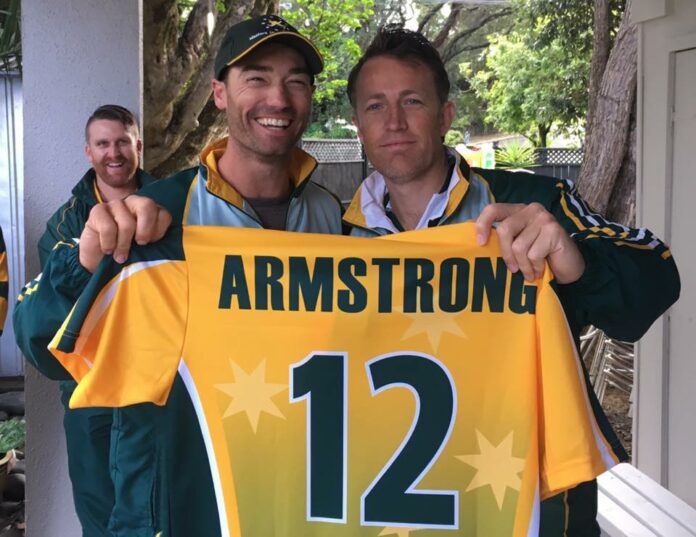
Amstrong, left, with his Australia over-35s shirt
Australian over 35s gold medallist Angus Armstrong on why masters hockey is an experience of a lifetime
Being selected in the Australian side for the first 2018 over 35s World Cup was an ultimate dream, which led to a gold medal in Barcelona.
It was evident very early on that there were high expectations not only from the coach but within the playing group. No one wanted to let anyone else down, which drove me to be my fittest.
My home is a 6,500-acre wheat farm in Narrogin, Western Australia. To help improve my fitness I constructed a 12km mountain bike trail on the property, mainly with a shovel and crowbar. Better than going to the gym for weights!
Each morning I would run various distances around the track and each night ride the bike around the whole course. The only scary moment was one evening going over a blind jump. I landed on a snake that flicked up onto my back luckily biting the saddle and not me.
Attending the weekend training camp involved a three-hour drive to Perth, with an overnight stay before a very early six hour flight to Canberra. 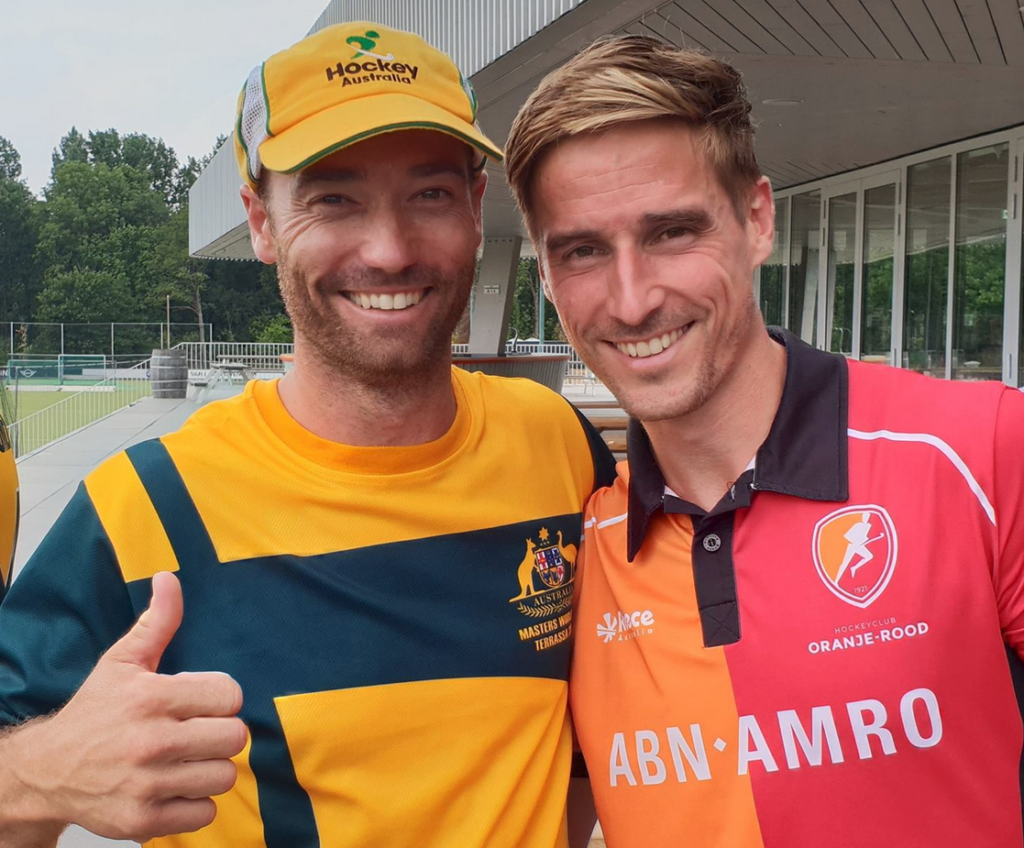
Even though players were spread all over Australia, arriving at the training camp I felt like we all knew each other from all the emails, phone calls, Facebook posts and general banter. After the camp the hype and sense of being in the campaign as a group heightened.
Taking the extra week in Eindhoven, Holland prior to going to Barcelona was a real experience. With training twice daily at a ground walking distance from our accommodation was great. The breakfasts were superb!
At the end of the week playing against the Oranje-Rood team formed the perfect introduction to the pressures of European Hockey and what we could expect at the World Cup.
Reflecting back, we spent a lot of time communicating to the coach, manager, physio and each other. But, none of this was wasted and agreed with our team motto “we got the job done”.
Master’s hockey and the World Cup is simply the experience of a life-time.
SIGN UP for The Hockey Paper’s returning newsletter: Promotions, exclusives and our best coverage
The Hockey Paper
Legendary Winger Samiullah`s Statue Installed in Bahawalpur
By Ijaz Chaudhry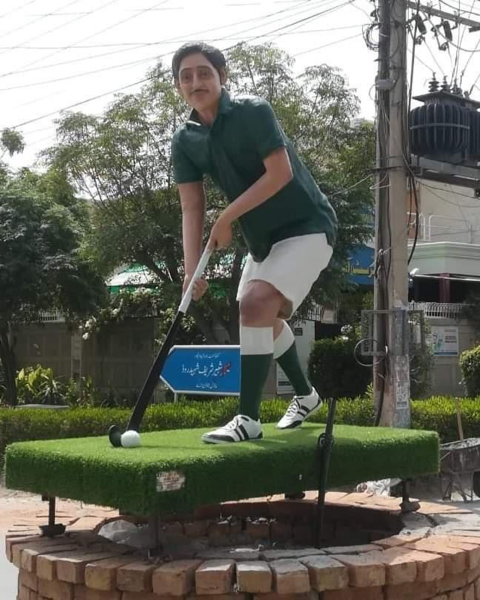
Samiullah Khan, one of the greatest if not the greatest left winger in the history of hockey, was honoured at his native city of Bahawalpur. His statue was installed at a busy crossing in the cantonment.
Popularly known as Flying Horse for his electrifying runs down the left flank, Samiullah played for Pakistan from 1973-82.
At World Cups, he was a member of two winning teams, in 1978 & 1982. Also has a silver from the 1975 World Cup.
Appeared in just one Olympics in 1976 where Pakistan won bronze.
Pakistan along with a number of other countries had boycotted the 1980 Olympics.
Three Asian Games Golds: 1974, 1978 & 1982 (when he was the captain) One Asia Cup Gold: 1982 (captain).
Samiullah was also an exceptional scorer for a winger.
He scored 55 goals in international hockey including 12 in four World Cup appearances.
Ijaz Chaudhry writes on hockey & other sports. For more about him and his work, visit: www.sportscorrespondent.info
Fieldhockey.com




